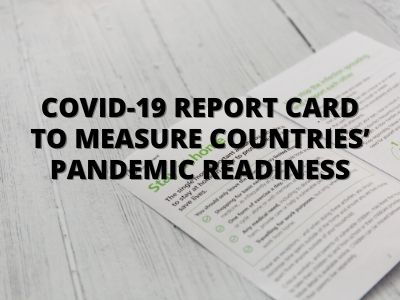COVID-19 Report Card to Assess Pandemic Readiness

Experts have created a report card to measure the readiness of a country in handling outbreaks. The COVID-19 Report Card will have several indicators to evaluate the countries’ preparedness in combating a pandemic.
Inaccuracy of GHSI
Pandemic preparedness has not equated to effective pandemic management. Assessments such as the Global Health Security Index (GHSI), which was designed to evaluate the readiness of countries to combat an infectious disease outbreak has not proven dependable, as it ranked countries like the United States highly, but the truth, in fact, the said country is nearing almost four million COVID-19 cases. On the other hand, countries like Vietnam is ranked lowly, but in reality, Vietnam has recorded no local transmission for three months straight.
The COVID-19 Report Card
The COVID-19 report card measures a country’s management the pandemic based on seven key factors. The indicators are:
- The ability to discover and cut off transmission chains.
Efficiently tracking the virus, the carrier and curbing it shows a country’s potential in containing the spread. The ability to detect the carriers of the virus and to put them in quarantine will break the transmission chains. Consequently, this will minimise the chances of the virus spread. - The ability of healthcare systems to reduce death and severe complications.
Most countries are more prepared in handling the second wave of the virus, after the initial outbreak in late 2019. Hospitals and healthcare response time and immediate action will show how ready the workers are in handling infected individuals and getting them the care that they need. - The ability to protect healthcare workers.
The front liners are vital, now more than ever. Making sure they are safe and well equipped with the appropriate protective gear is a key factor in the COVID-19 fight. - The ability to maintain a supply of adequate food and medical aid.
A country’s ability to continually provide their citizens with food and medical aid is vital to ensure their survivability and wellbeing. This will also reduce panic buying and chaos among the citizens in general. - The ability to protect the vulnerable and neglected groups.
The vulnerable groups are the older segments of the population and neglected groups are low incomes earners, who might not be up to date with the latest news regarding the virus. Thus, it is the country’s responsibility to ensure these groups are tended to. - The healthcare system’s potential to maintain its general health services, excluding those which are related to the pandemic.
Hospitals and health care ability to equally care for non-COVID-19 cases are also taken into account. Along with fighting the coronavirus, other areas of health problems must not be neglected. - The amount of financial help for individuals and companies, especially those in need of treatment.
Financial aid is crucial during these testing times, as more businesses are shutting down, and the economy as a whole is collapsing. A country’s ability to lightening the burden of its people is an essential aspect in determining the nation’s success in handling the pandemic.
The Future
These factors are comprehensive and are helpful in signalling if the country sinks in further distress or if the country is ready to ease the lockdowns and restart its economy to connect to the world.








